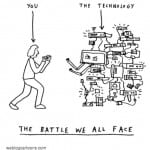Preparation for conferences requires boundaries. Limits on minutes and slides demands conciseness as key messages are extracted and difficult decisions made about what to leave behind. The parts you present are only ever a fraction of the whole story.
Flipping the Institution is at the University of Greenwich on 7th July. The deadline for uploading presentation slides is 29th June. As always it’s a tight squeeze. Not only in terms of preparation but because the guidance says ten slides only. I confess to not counting the introduction and conclusion and hope I will be forgiven.
Not being a fan of the Prezi slide and glide style, I’ve stayed with PowerPoint, using pictures rather than all text. I’m not sure how it will work but will find out on the 7th! Preloaded presentations are being made available in advance for participants to decide which sessions to attend. My concern is if the pictures will tell the story out of context so I’m hoping the preload includes note fields. It’s like making lecture content available before the event. It takes away any elements of surprise so in spite of the value I understand reluctance to do so.
I often think of presentations as a journey; beginning with who are you, where you’re from and why you’re there, followed by the problem, what you did it and why you did it, then the results, their implications and lastly a summary pulling it all together. That’s the plan and these are the headlines from each slide.
Introduction
1. For many people working with technology can be a challenge.
2. technophan or technophobe – digital divides on campus.
3. The literature identifies a need to support academic staff to engage with digital ways of working.
4.. Introduction to my research using the poster from a recent Show and Tell event.
5. Four key themes from my literature review of the field of educational technology.
6. To move forward sometimes benefits from looking back, in this case to the NCIHE report into the future of higher education (Dearing Report 1997).
7. Data analysis suggests four key themes emerging.
8. Myths of digital confidence influence how support is provided.
9. Data surprise; unexpected findings.
10. Quotes from the data analysis.
Summary and conclusion.
Looking forward to 7th July 🙂



Comments are closed.